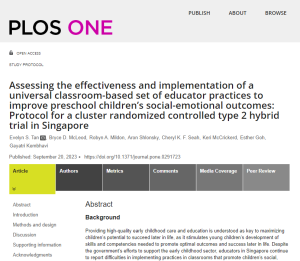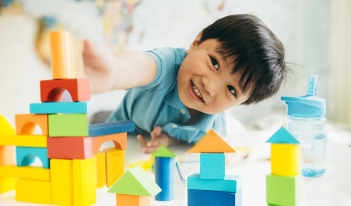A child’s ability to understand, express and regulate their emotions and behaviours, and their capacity to develop meaningful relationships are key to success in school and in life. High-quality early childhood care and education can be fundamental to enhancing such ‘life success’ factors – especially for children experiencing disadvantage. However, data from Singapore shows that educators often feel ill-equipped to support the diverse needs of children in growing their social-emotional skills.
CEI is partnering with the Centre for Holistic Initiatives for Learning and Development (CHILD) in an Asia-first trial to test the use of common elements for social-emotional skills development in a light-touch implementation model.
The Enhancing and Supporting Early development to better children's Lives (EASEL) Approach is a set of educator-led practices for 3- to 6-year-olds designed to enhance social, emotional and behavioural skills, and build improved executive function in the brain.
“We know that early life experience is vital to building our social skills, our emotional regulation, our resilience – all strong facilitators of good mental and physical health throughout life,” says Dr Cheryl Seah, CEI Director and Senior Investigator for the EASEL trial.
“Our trial will examine the difference that can be made when early childhood educators put a specific focus on these domains of development through evidence-informed and locally relevant classroom interactions and play activities.”
“Despite government efforts to support early childhood educators, they continue to report difficulties in implementing classroom practices promoting social, emotional, behavioural and cognitive outcomes for children,” explains CEI Senior Advisor Dr Evelyn Tan. “We want to understand why, and whether the EASEL Approach can help.”
Developed by CEI’s National University of Singapore partner, the Centre for Holistic Initiatives for Learning and Development (CHILD), EASEL distils common elements from multiple evidence-based initiatives, to create context-relevant and easy-to-use practices for local educators.
More than 500 children and 45 educators, across 18 early childhood care centres, are involved in the EASEL trial. Half the centres are being given access to training, personalised coaching and learning materials to implement the EASEL Approach, while the other half forms a control group and carry on with business-as-usual. Questionnaires for educators and parents, alongside assessments and classroom observations, will be used to collect data on educators’ practices and children’s development across the course of the current year, with results expected in early 2024.
“We’ll assess all the data to understand whether there have been gains in the educators’ classroom practices and the children’s social, emotional, behavioural and executive function outcomes because of the EASEL Approach,” says Evelyn. “We’ll also be looking at what supports are most useful in helping educators put EASEL to work in their classrooms, to inform more widespread implementation should the trial results prove positive.”
“Our goal is to give all early childhood educators the right tools to support children so they can optimally develop – socially, emotionally, behaviourally and cognitively,” says Cheryl. “The benefits of this would be enormous for our youngest generation and have flow-on effects for their families and communities.”
The EASEL Approach trial is a partnership between CEI, CHILD at the National University of Singapore, supported by Singapore’s Early Childhood Development Agency.
UPDATE September 2023: a protocol paper on the EASEL project has now been published.



